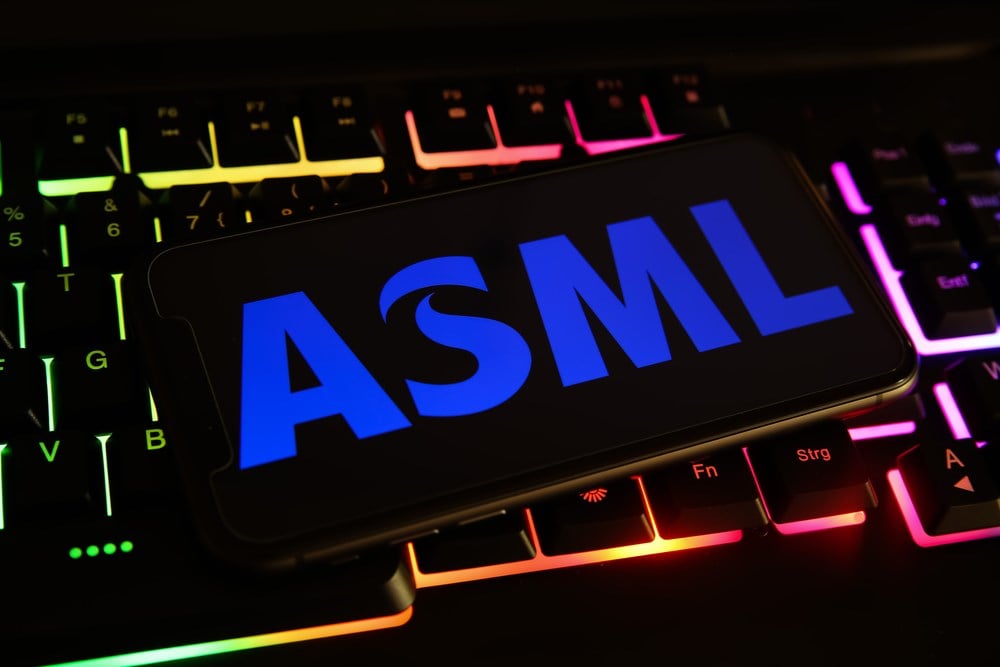ASML Reports Massive Growth, Management Points To Sluggish 2023 ASML reported strong Q1 2023 earnings, but warned of a potentially challenging 2023 due to sluggish demand and a decline in bookings for its EUV technology.
Our biggest sale — Get unlimited access to Entrepreneur.com at an unbeatable price. Use code SAVE50 at checkout.*
Claim Offer*Offer only available to new subscribers
This story originally appeared on MarketBeat

ASML (NASDAQ: ASML) reported its first quarter 2023 earnings this morning as the Dutch semiconductor equipment manufacturer gears up for what the year may hold for the semiconductor industry. ASML shares are trading lower today, selling off by as much as 3.65% after the announcement. Companies like Intel (NASDAQ: INTC) and Dell Technologies (NYSE: DELL) have reported sluggish demand in their computer segments, leading up to Apple (NASDAQ: AAPL) announcing its very own 40% decline in PC shipments.
Despite pleasing investors and other stakeholders in ASML through monstrous growth relative to the first quarter of 2022, management has pointed to a darker 2023, where growth rates and bottom lines may make it difficult for bulls to savor this celebratory moment. However, keeping the long-term in mind may help current and would-be investors in ASML notice the potential upside and drivers for the semiconductor manufacturer.
Red Light or U-Turn
ASML CEO Peter Wennick stated that the overall demand for their semiconductor manufacturing equipment, namely their EUV (Extreme Ultra Violet) technology aiding the production of today's chips and semiconductors that power personal computers and other vital electronics, however, on a year-on-year basis, bookings for the EUV equipment have dropped by 46% as a result of global economic slowdowns and a continued shrink of the personal computer market. With backlog orders equaling $42.6 billion, ASML is giving markets mixed signals regarding existing demand and a simultaneous decline in bookings; perhaps the manufacturer is still working to bring industry inventory levels to a healthier level and only pointing to investors that there may be a slowdown coming soon.
Taiwan Semiconductor Manufacturing (NYSE: TSM) missed sales expectations for a second consecutive quarter, signaling a further slowdown in the industry. Additionally, with Taiwan Semiconductor being ASML's biggest customer, investors may be concerned that some of the elevated backlog value may only partially realize as some customers may cancel or reduce their total bookings. ASML has cornered the semiconductor manufacturing equipment market with its reliable and advanced technology and methodologies. However, ASML still depends on the capital expenditure for the downstream companies that develop chips, such as Taiwan Semiconductor and other foundries; with these names slowing some of their spending in additional machinery and equipment, ASML finds itself in a pinch.
Why is ASML management pointing to further expansions in the second quarter of 2023? Sales are poised to grow to $6.5 and $7.0 billion, a range that would translate to a 4% decline or 4% advance, respectively; however, total 2023 figures are guided to reflect a net 25% increase in revenues when it is all said and done. These bullish assumptions can only be made when considering the global initiative to expand chip production outside China and Taiwan amid geopolitical risks and disruption scenarios like those seen during the COVID-19 pandemic.
Tilting the Playing Field
President Joe Biden's take on limiting China's access to semiconductor manufacturing equipment, with the Netherlands (and ASML as a result) following suit in blocking some exports to the Asian giant. This embargo for semiconductor manufacturing equipment against China can and will likely adversely affect ASML since the Chinese market represents the third-biggest buying pit for the Dutch player.
The offset to Chinese and Taiwanese demand comes from companies like Intel, one of which has landed collaboration deals with ASML for additional machinery and equipment within their EUV lithography product line. Intel is attempting to take on the foundry services market and catch up on the market share lost to Taiwan Semiconductor Manufacturing while at the same time aiding the North American semiconductor supply chain by diversifying sources away from Asia. Intel CEO Pat Gelsinger plans to expand their new foundry services segment, which currently represents only 1.4% of the firm's revenue; developing this new business while staying away from Chinese conflicts and geopolitical risks may aid ASML's top line and further realization of backlog orders.
Be Greedy When Others are Fearful?
As Warren Buffett likes to say, "Be greedy when others are fearful," this may beautifully apply to today's sell-off in ASML stock. The company has grown its net income margin by 9.3% to 29%. This retention of earnings immediately trickled down to earnings per share for investors, which grew by 186% compared to a year prior. Coupled with massive EPS growth came the retirement of seven million shares as the company implemented share buybacks throughout the year, as well as debt reduction, which took the equity in the balance sheet from 24.3% in the last quarter of 2022 up to 27.8% in the first quarter of 2023.
Increased equity and share buybacks directly increase a shareholder's ownership in the underlying business, pushing the book value per share of the company. Assuming that the macro-dynamics remain to demand higher for the semiconductor manufacturing equipment, and management achieves its 25% revenue increase goals, keeping margins the same and the number of shares constant, investors could expect 2023 earnings per share to be around $20 and $22 and thus providing a reasonable increase to today's upside target placed by analysts.









